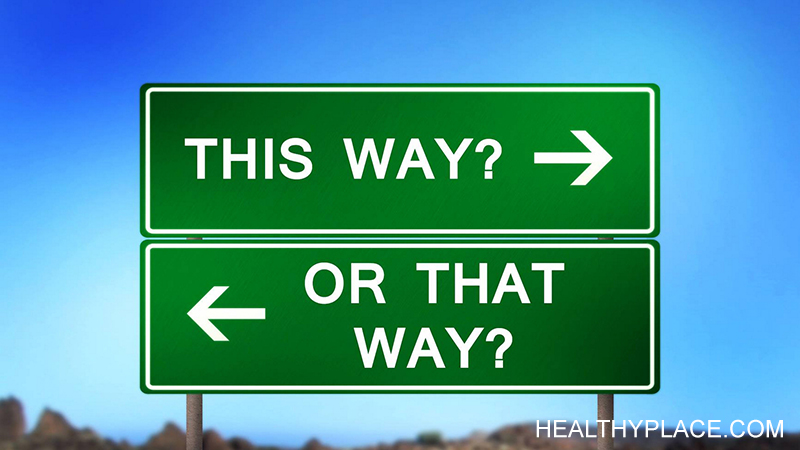How To Improve Decision-Making Despite Anxiety

Anxiety can affect decision-making. Anxiety is a fact in the lives of many individuals, but for some it is much more present and even crippling (What is Anxiety? Anxiety Definition). For the extremely anxious, making decisions can be both difficult and burdensome.
Think about the last time you made a decision, how did you feel? Were you overwhelmed by the number of possibilities and outcomes? Anxiety can make decisions like what college major you should choose or what to order for dinner feel almost impossible.
Scientists at the University of Pittsburgh discovered that anxiety may actually disengage a part of the brain, known as the prefrontal cortex, that is essential for flexible decision-making. In a study published in the Journal of Neuroscience, researchers report that anxiety during decision-making causes a group of cells specifically coded for choice to become weakened and disengaged in a highly specialized manner.
This means that when anxious individuals are presented with distractions while trying to make a decision, they may make bad decisions or struggle with being decisive.
How to Prevent Distractions and Make Decisions with Anxiety
Like anxiety, distractions are a reality in our lives. We live in a time where stimulation is directed at us constantly, making decisiveness extremely difficult. We have thousands of options to choose from in every arena of our lives, so how do we silence this noise?
- Make a list. Narrowing down your options can be extremely helpful. Make a list of 5-10 options and cross one off until you have arrived at the most desirable and logical choice.
- Explore the pros and cons. This is another type of list that can be used to minimize distractions and prevent faulty decision-making.
- Consult trustworthy sources. Having access to a lot of information does not always mean that you are getting the best information. Examine your sources and use the ones that you really trust.
- Imagine situations. When you are making a difficult decision it can be extremely helpful to imagine what each of them would look and feel like (Visualization Can Conquer Anxiety). Play out different scenarios in your head and decide which feels most comfortable.
- Set a deadline. Give yourself a reasonable and realistic time frame to make your decision. Too much time and you’ll procrastinate, too little time you make feel rushed or unprepared.
Decision-Making with Anxiety
Decision-making can be very anxiety provoking, even for the calmest of individuals. There is always a level of fear that we may not make the right decision. However, indecision is also a decision. When you are too anxious to move, you are making the conscious decision to sit still. There is always the chance that you will fail and there is always a chance that you will succeed. Use these five tactics to help quiet your anxious mind and prevent that essential decision making part of the brain from disengaging and sending you into a tail spin.
Find Whitney on Facebook, as DontTellMeToChill on Instagram, on Twitter, on Google+and on her website.
APA Reference
Hawkins, W.
(2016, March 23). How To Improve Decision-Making Despite Anxiety, HealthyPlace. Retrieved
on 2026, March 4 from https://www.healthyplace.com/blogs/treatinganxiety/2016/03/anxiety-and-decision-making
Author: Whitney Hawkins
Decision-making presents cardinal life skill that permit to improve our daily difficulties. But this personal performance is submit to many subjective and objective hindrances, as well. So it is of great relevance to observe your five mindful and advisable point in front of any decision making act. When it is in question anxiety disorder, the issue becomes more challenging, because this emotional turmoil is overloaded with the feeling of fear and inconstancy. However, decision-making affinity improves emotional difficulties, such are anxious insults and constrains, as well. Beside these five useful preliminary steps it is mindful suggestion to procrastinate any decision making for only one night time, after sleeping. It ought to give some appropriate time to our brain to review thoroughly all expounded choices. In addition, when it is known that our brain working more during sleeping time. Let's use this psycho-physiologic advantage, in order to choice more adequate option, before to make the respective decision !
Lately my anxiety attacks have returned I had three in the last four days. I have been off my anxiety medication for a year and no they won't put me back on it already asked. It is now not prescribed in the state of CT as they have decided that benzodiazepines are adictive as per the DEA any thoughts of what I can do to help my situation ?
With anxiety, I made some bad business decisions. Then I hit rock bottom and lived 1 year in paranoia and fear. Slowly coming out of my cage. don't want to go back there again. Must slow down and think. Look at the worlds beauty.
This is so true and it is even worse for me when I drink caffeinated drinks because they make me hyper, paranoid, and confused. I also don't like it when others spring big things on me at the very last minute.
I was in a major auto accident when I was 18 years old, that left me in the hospital for 3.5 months and with only a five percent chance of life. I had 2 brain surgeries for pressure reasons, a liver laceration, a Tracheotomy, and my body's right side was paralyzed for about 6 months. Yes, the recovery did take me years, but, I can say thank you Lord and I have fully recovered. I am now fully recovered and I am 45 years of age. My lack of short term memory and being easily distracted by nearly everything, has really "disabled" my life. I don't know if I have adult ADD, ADHD, or whatever, My dream is to help these short comings, but, I am not sure if this is possible. Thanks to all!